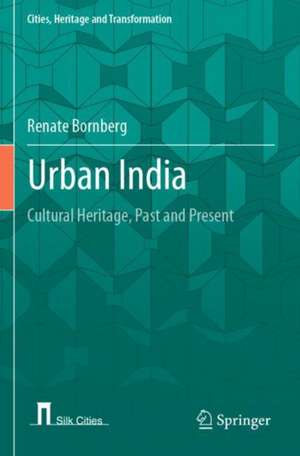Urban India: Cultural Heritage, Past and Present: Cities, Heritage and Transformation
Autor Renate Bornbergen Limba Engleză Paperback – 5 mar 2024
This book discusses the importance of socio-spatial patterns in cities that are embedded in the cultural heritage and self-understanding of a society, showing that Indian cities follow different urban concepts. In nine episodes (nine is a sacred figure), it highlights the principal influences and social impacts on cities from ancient times to contemporary city developments. As such, it provides planners and architects with insights that can easily be applied in contemporary cities and towns and help foster India’s cultural heritage—a much-needed, but little-discussed approach.
Indian cities are the result of various factors, some imposed, others following local traditions that shaped them. They were founded around social needs, landscape conditions and production routines, as well as the religious influences of Hinduism, Buddhism, Jainism, Sikhism, Islam, Christianity and animism. However, Western town-planning models are often implemented, blurring the traditional way of life in cities. For sustainable town development, it is of key importance to find solutions that deal with Indian city models.
| Toate formatele și edițiile | Preț | Express |
|---|---|---|
| Paperback (1) | 786.15 lei 39-44 zile | |
| Springer International Publishing – 5 mar 2024 | 786.15 lei 39-44 zile | |
| Hardback (1) | 952.57 lei 6-8 săpt. | |
| Springer International Publishing – 4 mar 2023 | 952.57 lei 6-8 săpt. |
Preț: 786.15 lei
Preț vechi: 1034.40 lei
-24% Nou
Puncte Express: 1179
Preț estimativ în valută:
150.43€ • 160.86$ • 125.43£
150.43€ • 160.86$ • 125.43£
Carte tipărită la comandă
Livrare economică 14-19 aprilie
Preluare comenzi: 021 569.72.76
Specificații
ISBN-13: 9783031237393
ISBN-10: 3031237390
Pagini: 312
Ilustrații: XXIV, 312 p. 173 illus., 172 illus. in color.
Dimensiuni: 155 x 235 mm
Ediția:2023
Editura: Springer International Publishing
Colecția Springer
Seria Cities, Heritage and Transformation
Locul publicării:Cham, Switzerland
ISBN-10: 3031237390
Pagini: 312
Ilustrații: XXIV, 312 p. 173 illus., 172 illus. in color.
Dimensiuni: 155 x 235 mm
Ediția:2023
Editura: Springer International Publishing
Colecția Springer
Seria Cities, Heritage and Transformation
Locul publicării:Cham, Switzerland
Cuprins
India in nine episodes.- India – some insights.- Planning theories.- Of ancient times.- At home.- Public spaces.- Gods and the city.- Kings and the city.- Muslims and the city.- The British and the city.- Outsiders and the city.
Notă biografică
Renate Bornberg is the founder of buTa | bornberg urban theory and application. She is a lecturer at the TU Wien, Austria, and the editor-in-chief of the interdisciplinary Journal of Comparative Cultural Studies in Architecture (jccs-a). She is member of the board ICOMOS Austria and monitor for the World Hertage Site " Wachau/ Austria", as well as AAV of ICOMOS International.
Renate Bornberg received her diploma in architecture and her PhD from the TU Wien, Austria. After working as an architect, she was lecturer at the University of Liverpool, and locum professor at the Leibniz University of Hanover, before she became a lecturer at the TU Wien.
Her research focuses on comparative settlement structures in both, primitive and so called high cultures, including European and Non-European cities, villages and compounds. Of particular interest are the social implications that are embedded in the built environment.
Textul de pe ultima copertă
This book discusses the importance of socio-spatial patterns in cities that are embedded in the cultural heritage and self-understanding of a society, showing that Indian cities follow different urban concepts. In nine episodes (nine is a sacred figure), it highlights the principal influences and social impacts on cities from ancient times to contemporary city developments. As such, it provides planners and architects with insights that can easily be applied in contemporary cities and towns and help foster India’s cultural heritage—a much-needed, but little-discussed approach.
Indian cities are the result of various factors, some imposed, others following local traditions that shaped them. They were founded around social needs, landscape conditions and production routines, as well as the religious influences of Hinduism, Buddhism, Jainism, Sikhism, Islam, Christianity and animism. However, Western town-planning models are often implemented, blurring the traditional way of life in cities. For sustainable town development, it is of key importance to find solutions that deal with Indian city models.
Caracteristici
Presents an overview of the socio-spatial patterns of Indian cities past and present and their culture Includes numerous drawings and photos, making it easy to follow Provides important debate for fostering cultural heritage in Indian cities





